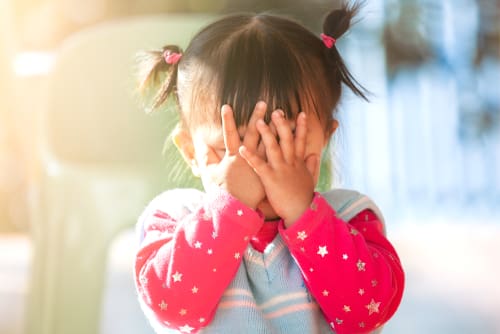
Do you remember peekaboo moments with your parents? It’s probably one of the earliest games parents play with children. First, it is super easy. Second, it’s a game that can be played anywhere. Third, it delights both parent and child. Mother and/or father cover their eyes and baby doesn’t know where her caretaker went. Although the person is right there, without eye contact, baby feels lost. That’s why the peek lasts just a second or two and then Mom or Dad says “Boo” and they are back with their child and the child knows their beloved parent has returned.
We think of this as a baby’s game. Simple to play and understand — except it is actually anything but simple. Peekaboo gets played again and again throughout our lives. Depending on how mother and father played the game with us – the literal and metaphorical game – tells us much about how we will handle our own peekaboo moments in our adult lives.
If we have a secure connection to our parents we learn that when mom and dad go away not only will they be back, but they will also meet our needs. From there, we have the opportunity to develop security within self to meet others and explore our world. If we are not secure that mom and dad will still be there when they go into the peek it can be scary to see the parent return with the “boo.” Further, it can be difficult as we grow up to keep this connection to our primary caretakers and have trust that our needs will be met by them. Often we have not had time or space to figure out ourselves and our own worlds when we don’t have this secure foundation of connection.
Fast forward to being an adult and peekaboo moments unfold left and right — we just don’t see them from this frame. Often this most often can be seen with our love interests. First, when we meet someone whom we are romantically interested in, some part of ourselves is on the line in ways that may not be when we are forming friendships, although these moments can play out in friendships too or any relationship in fact.
What happens? We meet and then the person disappears. You may have exchanged phone numbers, you may already be communicating, you may have even had coffee or another date or two. However, when the connection time is over, the peek comes in, i.e. the person takes their leave. Now, how we handle this moment says much about our connection to ourselves and how we experienced those original peekaboo moments with our first caretakers.
What do I mean? Well, check in with yourself. Does it make you nervous to be in their absence? Do you find yourself calling them in an anxious state to see (for yourself) if they are still there and still interested in you — if they pick up the phone and you hear their voice — is there an immediate end to your anxious state? Of course that is the “boo” moment – that special moment when the person reappears. What happens? If anxiety is not alleviated, do you find yourself angry or agitated. My guess is by tuning into how you deal with the peekaboo game with your adult relationships will reveal insight into how you experienced this with your earliest connections.
This is a place to drop defenses and become curious.
Ideally, when we meet someone it is completely exciting. We often fall down the Alice in Wonderland rabbit hole into something amazing. However, part of the amazement is being able to tolerate the peekaboo moments – when the person is there and then is not. After all, we are getting to know someone and they are getting to know us. It takes time — and more than a few seconds like we experienced in that early game in our lives.
Framing this type of anxiety into a game of peekaboo where we have a chance to not only experience how we feel when the peek and the boo take place, but also observe what this may say about our earliest time in our lives and how we were received by our primary caretakers.
Peekaboo! I’ll be right back!






